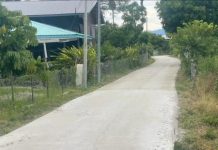
KOTA KINABALU: Various topics were discussed during the Second Sabah Port Forum held on Oct 1 to 2 with presentations by distinguished speakers ranging from port, logistics, trade facilitation and cross border trade among others.
In one of the sessions on October 2, 2019, a specific topic on cross border trade were discussed.
Three distinguished speakers namely Datuk Roselan Johar (Chairman of BEBC, Malaysia), Mejar Radhi bin Mohamad (COO of Penang Port Sdn. Bhd) and Dr Rafiq Idris (UMS) were invited to share their knowledge and experience.
In general, all the speakers highlighted the importance and potential of cross border trade. They discussed the issues, challenges and opportunities in cross border trade in Sabah and from Malaysia’s experience of cross border trade activities with Southern Thailand.
In this regard, Dr Rafiq Idris, a Senior Lecturer in the Faculty of Business, Economics and Accountancy, University Malaysia Sabah (UMS), an Associate Fellow in Ungku Aziz Centre for Development Studies, University of Malaya and who is also the Chairman of Sabah Economic and Education Society emphasized that cross border trade in many instances was important for trade especially for non-maritime countries.
He said there were many experiences garnered from certain countries. For instance, research shows that for over half of Irish exporters, Northern Ireland is the destination for more than 50 per cent of their exports (Department of Business, Enterprise and Innovation Ireland, 2018). At certain border posts in Africa, estimates suggest that small-scale trade eclipses formal trade in both volume and value (UNCTAD, 2019).
According to Dr Rafiq, the US trade more with Canada and Mexico compared to all other countries (except China) in 2018. US total trade with Mexico and Canada were 14.4% and 14.5% respectively (based on data from COMTRADE, 2019).
“ Indeed, this can be attributed to common border. Wei (1996) finds that OECD countries buy about 2.5 times more from themselves than from identical foreign countries (Magerman et.al, 2015),” he said adding that many recent studies however show that the effects were getting less significant over time. Rafiq (2017) found that common border affects Malaysia’s export significantly.
Dr Rafiq gave special emphasis on cross border trade in the context of Sabah- Kalimantan trade. If good road connectivity is available, infrastructure is ready and business friendly policy is in place, bilateral trade with Kalimantan could grow significantly.
“The justification is clear: per capita income in both north and east Kalimantan is higher than Sabah, market size in Kalimantan is huge and the announcement made by the Indonesian president on the relocation of capital city to east Kalimantan. It is high time to consider the road connectivity proposal. Dr Rafiq is optimistic with the pro-active step taken by the state government through its visit to the provinces in Kalimantan recently, headed by YAB Sabah Chief Minister.”
“I hope proper complex for customs, immigration and quarantines together with other necessary infrastructure and offices will be made ready in strategic locations so that cross border trade processes can be facilitated and economic activities in border areas can be stimulated,” he stated.
Dr Rafiq also stressed that possible adverse effects from greater interaction should not be overlooked and necessary comprehensive study is not an option.-pr/BNN





